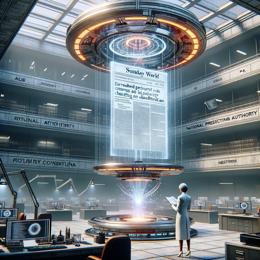Image created by AI
Chief Justice Raymond Zondo Calls for Judicial Independence Strengthening Amid Pending Retirement
As Chief Justice Raymond Zondo prepares for his retirement next month, he emphasizes the urgent need to reinforce the judiciary's institutional independence. Appointed to the highest judicial seat in March 2022, Zondo has consistently placed this issue at the forefront of his agenda.
In a poignant address at the Judges' Conference last December, Zondo publicly urged President Cyril Ramaphosa to finalize projects initiated by the former president Jacob Zuma aimed at establishing a judiciary free from political influence. The inception of the Office of the Chief Justice by Zuma in 2010 signaled initial steps towards this goal, but Zondo's remarks at the conference suggest a growing impatience among the judiciary with the pace of these reforms.
During the presentation of the 2022/23 annual judiciary report at the Constitutional Court in Johannesburg, Zondo pointed to the better situation of judiciaries in other African countries, which have successfully mobilized the legal system to secure their independence from the executive branch. He expressed a preferable resolution through constructive discussions, reiterating the topic's priority status.
The Chief Justice also disclosed details about his communications with Ramaphosa, referencing a meeting in December 2022 that concluded with an agreement for further dialogue—a meeting that has yet to happen despite Zondo's reminders. With his retirement on the horizon, Zondo intends to secure progress on this front.
The delivery of the annual judiciary report coincided with the announcement of Deputy Chief Justice Mandisa Maya's ascendancy to the helm of the judiciary starting September 1st, making history as the first woman to assume this role. Zondo commended her support and their shared commitment to transparency with the public regarding the judiciary's performance.
As per the report for the 2022/23 financial year, the judiciary scored well, hitting 11 out of 13 performance targets. Nevertheless, areas requiring improvement were also laid bare, including the falling short of finalizing the targeted number of Constitutional Court cases and reducing criminal case backlogs.
The Constitutional Court concluded 263 of 481 cases, missing its 70% goal with a 55% mark—a drop Zondo mentioned is under examination to identify causes. The report aired a proposal for more resources and potentially experienced legal practitioners to assist the justices, awaiting a response from the executive branch.
Similar resource constraints were observed in the labour court, which hit its target but voiced the necessity of more judges and court spaces to manage the workload. A lack of response to requests for necessary expansion reflects the broader tension between the judiciary's needs and the executive's responsiveness.
Regarding criminal case backlogs, the judiciary fell short of its targeted reductions with actual figures around 47%, with specific high court divisions—Northern Cape, KwaZulu-Natal, and Eastern Cape—notables for their insufficient progress.
Zondo concluded by acknowledging the deleterious effects of persistent load shedding on court operations and the judiciary's committed stance on backlog elimination.










